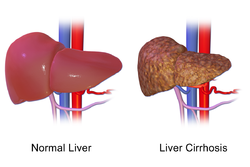Familial cirrhosis

Editor-In-Chief: Prab R Tumpati, MD
Obesity, Sleep & Internal medicine
Founder, WikiMD Wellnesspedia &
W8MD's medical weight loss NYC, sleep center NYC
Philadelphia medical weight loss and Philadelphia sleep clinics
| Familial cirrhosis | |
|---|---|

| |
| Synonyms | N/A |
| Pronounce | N/A |
| Specialty | N/A |
| Symptoms | Fatigue, jaundice, abdominal swelling, easy bruising |
| Complications | Liver failure, portal hypertension, hepatic encephalopathy, hepatocellular carcinoma |
| Onset | Varies, often in adulthood |
| Duration | Long-term |
| Types | N/A |
| Causes | Genetic predisposition, alcohol use disorder, hepatitis |
| Risks | Family history, alcohol consumption, viral hepatitis |
| Diagnosis | Liver biopsy, blood tests, imaging studies |
| Differential diagnosis | Non-alcoholic fatty liver disease, autoimmune hepatitis, primary biliary cholangitis |
| Prevention | N/A |
| Treatment | Lifestyle modification, medication, liver transplant |
| Medication | N/A |
| Prognosis | Variable, depends on stage at diagnosis and treatment |
| Frequency | Rare |
| Deaths | N/A |
Familial cirrhosis is a type of liver disease that is inherited, meaning it is passed down from parents to their children. It is characterized by the progressive scarring of the liver, which can lead to liver failure.
Causes[edit]
Familial cirrhosis is caused by a variety of genetic mutations that affect the liver's ability to function properly. These mutations can be inherited from one or both parents. Some of the genes that have been associated with familial cirrhosis include ATP7B, SERPINA1, and HFE.
Symptoms[edit]
The symptoms of familial cirrhosis can vary widely, depending on the severity of the disease and the specific genetic mutation involved. Common symptoms can include jaundice, fatigue, weight loss, and abdominal pain. In severe cases, complications such as liver failure or liver cancer can occur.
Diagnosis[edit]
Diagnosis of familial cirrhosis typically involves a combination of physical examination, medical history, and laboratory tests. Genetic testing may also be used to identify the specific mutation causing the disease.
Treatment[edit]
Treatment for familial cirrhosis is aimed at managing symptoms and slowing the progression of the disease. This can include medications, lifestyle changes, and in severe cases, liver transplantation.
See also[edit]
References[edit]
<references />
Ad. Transform your life with W8MD's Budget GLP-1 injections from $75


W8MD offers a medical weight loss program to lose weight in Philadelphia. Our physician-supervised medical weight loss provides:
- Weight loss injections in NYC (generic and brand names):
- Zepbound / Mounjaro, Wegovy / Ozempic, Saxenda
- Most insurances accepted or discounted self-pay rates. We will obtain insurance prior authorizations if needed.
- Generic GLP1 weight loss injections from $75 for the starting dose.
- Also offer prescription weight loss medications including Phentermine, Qsymia, Diethylpropion, Contrave etc.
NYC weight loss doctor appointmentsNYC weight loss doctor appointments
Start your NYC weight loss journey today at our NYC medical weight loss and Philadelphia medical weight loss clinics.
- Call 718-946-5500 to lose weight in NYC or for medical weight loss in Philadelphia 215-676-2334.
- Tags:NYC medical weight loss, Philadelphia lose weight Zepbound NYC, Budget GLP1 weight loss injections, Wegovy Philadelphia, Wegovy NYC, Philadelphia medical weight loss, Brookly weight loss and Wegovy NYC
|
WikiMD's Wellness Encyclopedia |
| Let Food Be Thy Medicine Medicine Thy Food - Hippocrates |
Medical Disclaimer: WikiMD is not a substitute for professional medical advice. The information on WikiMD is provided as an information resource only, may be incorrect, outdated or misleading, and is not to be used or relied on for any diagnostic or treatment purposes. Please consult your health care provider before making any healthcare decisions or for guidance about a specific medical condition. WikiMD expressly disclaims responsibility, and shall have no liability, for any damages, loss, injury, or liability whatsoever suffered as a result of your reliance on the information contained in this site. By visiting this site you agree to the foregoing terms and conditions, which may from time to time be changed or supplemented by WikiMD. If you do not agree to the foregoing terms and conditions, you should not enter or use this site. See full disclaimer.
Credits:Most images are courtesy of Wikimedia commons, and templates, categories Wikipedia, licensed under CC BY SA or similar.
Translate this page: - East Asian
中文,
日本,
한국어,
South Asian
हिन्दी,
தமிழ்,
తెలుగు,
Urdu,
ಕನ್ನಡ,
Southeast Asian
Indonesian,
Vietnamese,
Thai,
မြန်မာဘာသာ,
বাংলা
European
español,
Deutsch,
français,
Greek,
português do Brasil,
polski,
română,
русский,
Nederlands,
norsk,
svenska,
suomi,
Italian
Middle Eastern & African
عربى,
Turkish,
Persian,
Hebrew,
Afrikaans,
isiZulu,
Kiswahili,
Other
Bulgarian,
Hungarian,
Czech,
Swedish,
മലയാളം,
मराठी,
ਪੰਜਾਬੀ,
ગુજરાતી,
Portuguese,
Ukrainian


